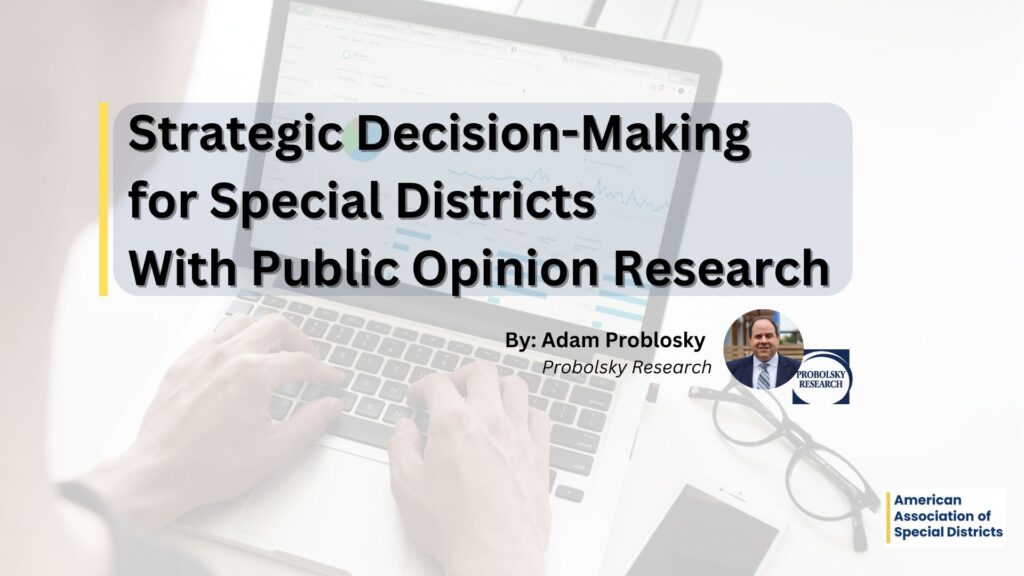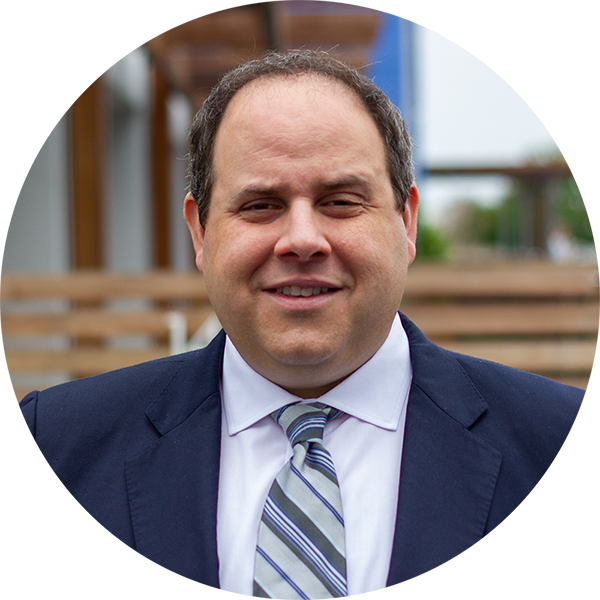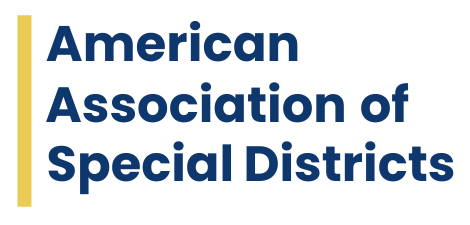By Adam Probolsky, President

Despite the essential role of special districts, we all know that they often operate in the background, with limited attention from the media and public. This obscurity often leads leadership to believe they can avoid some of the typical activities that other public agencies like cities and counties engage in. But that miscalculation can backfire.
Most cities, towns and counties conduct public opinion research – surveys, polls, and focus groups in some capacity. And many special districts do so too. Those that don’t, do so to their detriment. As the closest government to the people, special districts represent a bridge connecting the public-to-public policy. This should be exploited, not squandered.
Polling as a bridge to public policy and meaningful change
Polling is more than just data—it’s the bridge that connects the public to policymakers. Real insights come from understanding the emotional connections people have with policies and initiatives. After all, reducing mosquito-borne disease, limiting organics in the waste stream, encouraging water conservation, and increasing park and trail use all require a deep understanding of the public’s knowledge, opinions and understanding of the topics. Just like consumers do not naturally want to buy the latest sugar water drink—they are convinced that it’s cool, tasty, or both, by grand marketing efforts informed by market research – the same is true for public initiatives that require behavioral change.
Combining data and experience for effective decision-making
In decades past, when scrutiny was not a factor, special districts did not need to have a significant public profile. And many still don’t; however, at the moment a local watchdog or a mom with a small following on Instagram decides to make your agency a target, staying quiet won’t work anymore. The country is scattered with former elected officials who have lost their jobs for far less than a true scandal. And there are even more agencies that have been gobbled up or legislated out of business for not having had the forethought to think outside the walls of their headquarters and corporate yards.
As professional researchers, we never discount the institutional knowledge of staff and the constituent-board member interactions that happen at grocery stores and on the sidelines of local sporting events. Likewise, special districts should not dismiss polling and other public opinion research like focus groups conducted by professionals as unnecessary or a waste of resources. The hundreds of special districts, ranging from billion-dollar behemoths to tiny volunteer-run services, that regularly employ pollsters are all better off for it.
What about engagement and engagement platforms?
Pollsters celebrate engagement and engagement platforms. But it doesn’t require a professional to know that engagement efforts capture the views of a small, self-selected group. These individuals do not represent the community as a whole. Public meetings and engagement tools often attract the same passionate voices, leaving out the silent majority. Our research shows this majority is not going to engage meaningfully. They are focused on family, work and sports. Sorry to say, they do not think about your agency.
Accurate public opinion research addresses this gap by using statistically valid methodologies that capture a diverse cross-section of the population. It’s not just about gathering input; it’s about ensuring that all voices—especially those of the underserved or less vocal residents—are heard.
What if you have no budget for research?
There are very few pollsters who work primarily for local government. If you find yourself in a situation where you wish you had public opinion data, but lack the funds, call any of us and you will likely find a sympathetic ear and a willingness to volunteer our time. There are ways to conduct surveys, albeit lacking statistical validity, but still have some utility, for low or no cost.
Guide to talking to others about opinion research in local government
Here is a quick guide for talking to others at your agency about conducting a wide-ranging community survey related to the services you provide or a specific poll about an upcoming project, rate change, or ballot measure:
- Hiring the right professional research firm is just as important as hiring the right engineer or architect.
- Do-it-yourself surveys are a poor substitute for the real thing, but do them anyway if that is all you can afford. The data will at least be interesting and you will be demonstrating a genuine interest in what your constituents know, think, feel and hope.
- Even if just a small percentage of your constituents speak another language at home, consider communicating with them, and definitely survey them in that language.
- You can put real trust in science-based, statistically valid research. The results are accurate.
- Americans communicate primarily online, but some prefer to talk on the phone, some even on landlines. Mail and in-person might be important too. Research that ignores the communication habits of your constituents will never be accurate.
- Professional research puts into check the loudest voices who can often dominate the conversation and gives a voice to the whole community, even the ones that don’t want to, or don’t have the time to show up.
- Building public trust is not always a simple process. Knowing what your community cares about and how best to communicate with them can be your new superpower for making strong connections.

Adam Probolsky is president of Probolsky Research, a national Latina and woman owned market and opinion research firm.
Questions? Email contact@americasdistricts.org.
